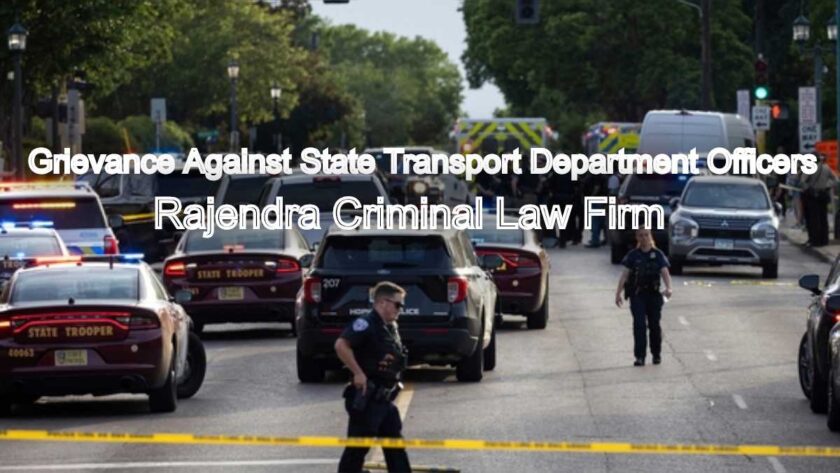Filing a Grievance: Dealing with government officials can sometimes be challenging. You might face issues with the State Transport Department. Officers might act improperly. You have the right to file a grievance. This process allows you to seek redress. Rajendra Criminal Law Firm can guide you. We understand the legal framework. We help you navigate this process. Our expertise ensures your voice is heard. We advocate for your rights.
Filing a Grievance Against State Transport Department Officers: Rajendra Criminal Law Firm
Understanding Your Rights: The Foundation of Grievance Filing
As a citizen, you possess certain rights. These rights extend to your interactions with government departments. You have the right to fair treatment. You deserve efficient service. If you believe your rights have been violated, you can file a grievance. The Constitution of India guarantees certain fundamental rights. These rights are protected. Moreover, specific laws govern the functioning of the State Transport Department. These laws outline the duties and responsibilities of its officers. Familiarizing yourself with these rights and laws is crucial. It forms the basis of your grievance.
Grounds for Filing a Grievance: Identifying Legitimate Concerns
Several situations can warrant filing a grievance. Misconduct by a transport officer is a valid ground. This can include corruption or bribery. Negligence in duty is another reason. Officers might fail to perform their responsibilities properly. Harassment or discrimination by officials can also be the basis of a grievance. Furthermore, undue delays in service delivery are legitimate concerns. If you have experienced any such issues, you have the right to complain. Our firm can help you identify if your situation constitutes a valid grievance under the law.
The Grievance Redressal Mechanism: A Step-by-Step Process
The State Transport Department likely has a specific grievance redressal mechanism. This mechanism outlines the procedure for filing complaints. Firstly, you usually need to submit a written complaint. This complaint should clearly state the details of your grievance. It should include the names of the concerned officers. Dates, times, and locations of the incident are important. You should also provide any supporting documents or evidence. Subsequently, you will need to submit this complaint to the designated authority. The department will then initiate an inquiry into your complaint. They might seek information from the concerned officer. They may also ask you for further details. After the inquiry, the department will take appropriate action. This could range from issuing a warning to the officer. It might even involve more stringent disciplinary measures. Throughout this process, our firm can assist you in drafting your complaint. We can also guide you on where and how to submit it.
Drafting a Comprehensive Complaint: Ensuring Clarity and Detail
Crafting a clear and detailed complaint is essential. Your complaint should be factual and concise. Avoid using abusive or inflammatory language. Clearly state the specific actions or inactions of the officer that you are complaining about. Provide specific dates, times, and locations of the incidents. Include the names and designations of the officers involved, if known. Attach any supporting documents, such as copies of receipts, letters, or photographs. A well-drafted complaint increases the chances of a swift and effective resolution. Our legal team can help you draft a comprehensive and legally sound grievance.
Submitting Your Grievance: Following the Correct Channels
Submitting your grievance to the correct authority is crucial. The State Transport Department might have different levels of grievance redressal. There might be a designated grievance officer at the local level. For more serious complaints, there might be a higher authority at the regional or state level. Ensure you submit your complaint through the proper channels. This will expedite the process. Our firm can advise you on the correct authorities to address your grievance. We ensure your complaint reaches the right hands.
Providing Supporting Evidence: Strengthening Your Case
Evidence plays a vital role in the grievance redressal process. Any documents, photographs, videos, or witness statements that support your claim should be included with your complaint. Keep copies of all documents you submit. This will serve as your record. Strong evidence strengthens your case. It makes it more likely that appropriate action will be taken. Our team can help you gather and organize relevant evidence.
Following Up on Your Grievance: Ensuring Accountability
After submitting your grievance, it is important to follow up. Keep a record of the date you submitted your complaint and to whom. If you do not receive a response within a reasonable timeframe, you can send a reminder. You might also be able to escalate your complaint to a higher authority if necessary. Persistence can sometimes be key in ensuring your grievance is addressed. We can assist you in tracking the progress of your complaint and advising you on the next steps if needed.
Legal Recourse: Exploring Further Options
If the grievance redressal mechanism of the State Transport Department does not yield a satisfactory outcome, you might have other legal options. Depending on the nature of your grievance, you could consider filing a writ petition in the High Court. A writ petition can seek judicial intervention to address issues of fundamental rights violations or abuse of power by government authorities. Additionally, you might have grounds to file a criminal complaint against the concerned officer in certain situations. Our firm can assess your situation and advise you on the available legal recourse. We can represent you in court if necessary.
The Importance of Timeliness: Acting Promptly
It is generally advisable to file a grievance as soon as possible after the incident occurs. Delays can sometimes weaken your case. Memories can fade, and evidence might become difficult to obtain. Furthermore, there might be limitation periods for taking legal action in certain circumstances. Acting promptly ensures that your grievance is addressed while the details are still fresh and the evidence is readily available. Our firm can help you act quickly and efficiently.
Rajendra Criminal Law Firm: Your Partner in Seeking Justice
While our firm is named Rajendra Criminal Law Firm, our expertise extends to matters involving grievances against government authorities. We understand the complexities of dealing with state departments. We are committed to helping you seek justice. Our experienced legal professionals can provide you with the guidance and representation you need. We will assist you at every stage of the grievance filing process. We will also explore all available legal options to ensure your concerns are addressed effectively.
Frequently Asked Questions
You can file a grievance for issues like misconduct (e.g., corruption), negligence in duty, harassment, discrimination, or undue delays in service delivery by State Transport Department officers. If you believe an officer acted improperly or violated your rights, a grievance is appropriate.
The first step is usually to prepare a written complaint. This complaint should clearly detail the incident, including dates, times, locations, names of involved officers, and a factual account of what happened. Include any supporting documents or evidence you possess.
The State Transport Department likely has a designated grievance redressal mechanism. You should submit your written complaint to the designated grievance officer at the local, regional, or state level, as specified by the department’s guidelines. Check the department’s website or inquire at their office for the correct procedure and address.
Relevant evidence can include copies of receipts, official letters, photographs, videos, witness statements, or any other documentation that supports your claims and provides factual backing to your grievance. Strong evidence strengthens your case.
If the department’s grievance redressal process does not provide a satisfactory resolution, you might have further legal options. Depending on the nature of your grievance, you could consider filing a writ petition in the High Court or, in certain cases, a criminal complaint. Consulting with a legal professional is advisable to explore these options.
Conclusion: Empowering You to Seek Redress
Filing a grievance against State Transport Department officers is your right. It is a mechanism to ensure accountability and seek redress for wrongdoings. Understanding your rights, following the correct procedures, and presenting a well-documented complaint are crucial steps. While the process can seem daunting, you do not have to navigate it alone. Rajendra Criminal Law Firm is here to provide you with expert legal guidance and support. We empower you to assert your rights and seek the justice you deserve. Contact us today to discuss your grievance and explore your options. We are committed to helping you achieve a fair resolution.
Read More
- How to Report Police Misconduct in Your State: A Comprehensive Guide
- Complaint Mechanism for Revenue Department Officers in State Governments
- How to File a Complaint Against State Government Officers
- How to Legally Protect Yourself from a Narcissistic Partner: A Lawyer’s Guide
- How to Report Issues With Officers in Central Ministries
- Centralized Public Grievance Redress and Monitoring System (CPGRAMS):





